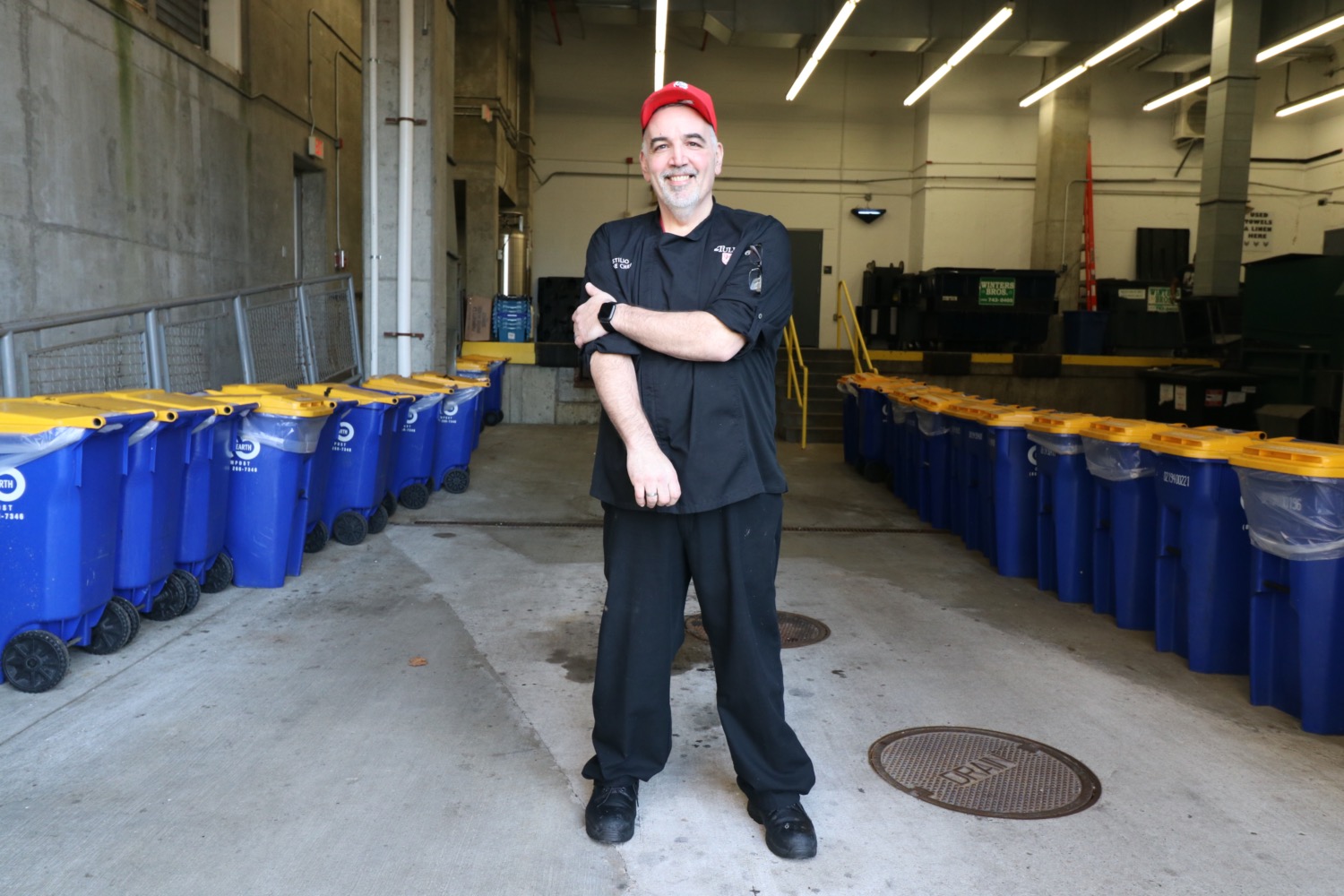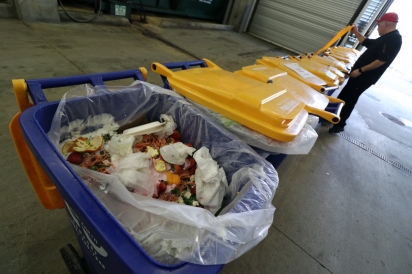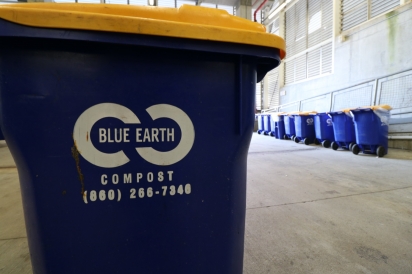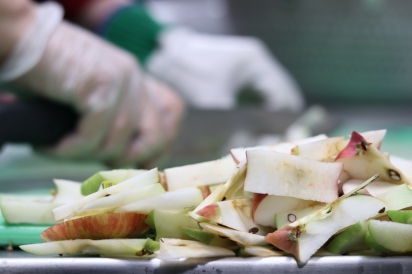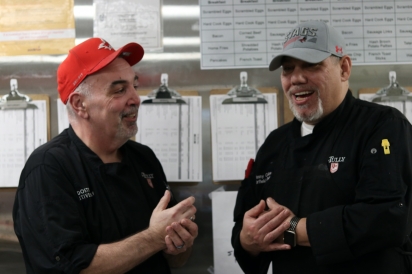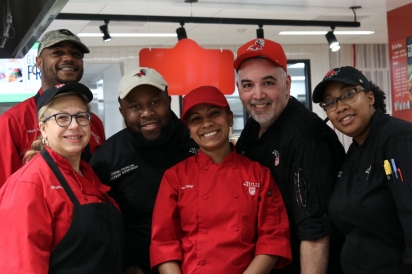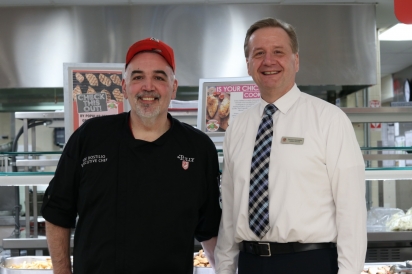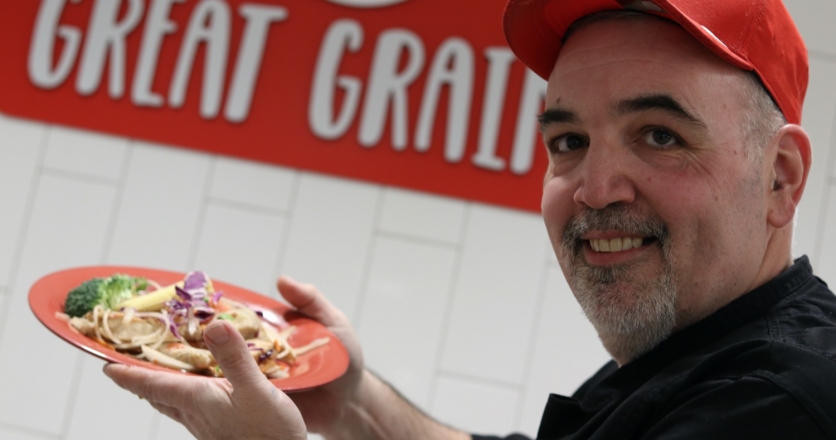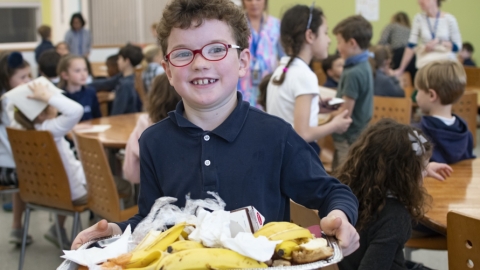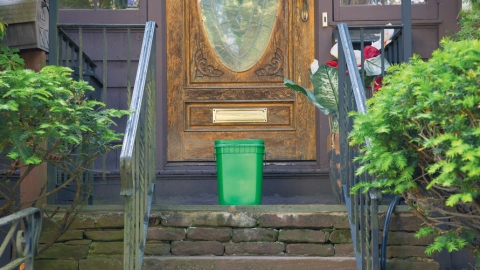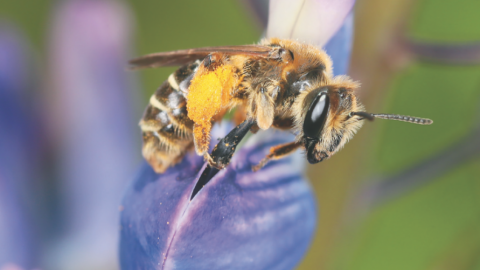Collegiate Conservation
Fairfield University’s Tully Dining Commons might be the Platonic ideal of a college cafeteria. In the modern, brightly lit space, students can order custom avocado toast, build salads from a gleaming selection of fresh greens, and load up on plant-based dishes. As he walks us through the space, Chef Joe Dostilio, the Resident Executive Chef at the Commons, proudly gestures to the lineup of pizzas, the Mexican station, and the hummus bar. The options, varied and abundant, could easily eclipse many food courts. Yet, with so much variety, food waste is inevitable. Other progressive college dining facilities might put out a compost bin and call it a day. Fairfield University, however, goes to great lengths to reduce food waste through programs that not only keep food out of the trash, but also help get that food to those who are in need.
Hunger is not a struggle commonly associated with Fairfield County, which is consistently ranked as the wealthiest county in Connecticut. Yet, according to a 2017 study by hunger-relief organization Feeding America, nearly 90,000 Fairfield County residents – a surprising 9.4% of the population – are food insecure. That means they lack consistent access to adequate food due to low income, geography, or other factors. Of those 90,000, almost 30,000 are kids.
In spite of this need, there’s a frightening amount going to waste. The Department of Energy and Environmental Protection (DEEP) estimated in 2015 that nearly 520,000 tons of food is thrown away in Connecticut each year. While the wasted potential of all this thrown-out food is already shameful, it’s only part of the problem. If it’s not composted, it will rot in landfills, generating greenhouse gases, such as methane, that contribute to climate change.
Fairfield University works to curb its food waste by partnering with Blue Earth Compost, a food scrap collection service in Hartford. Scraps and other inedible waste get picked up by Blue Earth, which sends the waste off to be converted into methane by the Quantum Biopower energy plant in Southington. The contained methane is then turned into electricity.
However, inedible food waste comprises only part of the food that Fairfield University aims to keep out of landfills. Salvaging edible “waste” – food that is uneaten but still perfectly serviceable – is the objective of Food Rescue US, which acts as a conduit between food donors, like Fairfield University, and people in need. Fairfield University kicked off its partnership with Food Rescue in September of 2018, supplying the organization with thousands of what the university calls “rescued meals,” which get delivered to food pantries and other locations around the county. Nicole Straight, site director for the Fairfield branch of Food Rescue, was deeply impressed with how quickly the university got on board with the program. “They had reached out to me a year and a half ago, and we had a meeting on, let’s say, Wednesday. And by Monday, they were donating their food,” Straight recalls. “That is remarkable.”
The university’s Food Rescue partnership is spearheaded by Chef Dostilio and General Manager of Dining Services, Duane Gornicki. Gornicki had previously served as Director of Residential Dining and Retail Services for the University of California at Riverside, where he developed food pantries for the 60% of their students who dealt with food insecurity. Before that, he worked as a “mystery shopper,” testing menu items from fast food restaurants before throwing them away, nearly untouched.
One day, as he prepared to throw out an uneaten bucket of fried chicken, he saw a man scrounging for food in a nearby dumpster, so he offered it to him. “From that day on, I realized that there is a need, that we just don’t see it,” says Gornicki.
Dostilio, who has worked in dining services at 10 other colleges, has seen how much waste is generated by all-you-can-eat dining plans. “Kids are not aware of how much [food] is actually being wasted in what they take,” says Dostilio. Part of cutting down on that waste comes down to educating students. “At Fairfield [University], they listen,” says Dostilio. “They want to learn about it.”
With Gornicki and Chef Dostilio at the helm, rescued food is treated with special care to ensure that it will be safe for others to eat. For example, it never sits out on the serving line, where it could be touched, breathed on, or exposed to airborne pathogens. That’s a crucial stipulation laid out by both Sodexo, the contracting food services company that the university works with, and the Connecticut Department of Health. Rescued food also gets rapidly cooled in a blast chiller to keep it from developing illness-causing bacteria. “Our chefs do a great job ensuring that food is safe, and they would even feel comfortable eating it,” Gornicki says.
Taste, of course, is another crucial factor in how the university handles food. While items like leftover chicken might not be as juicy as it would be straight from the oven, a good sauce can add moisture and help the chicken reheat evenly when volunteers serve it. Gornicki states that, as of this past December, 10,360 pounds – over five tons – of food have been rescued by Fairfield University during the program’s lifetime, equivalent to more than 8,000 meals, and it looks like the university is on track to expand those numbers. He estimates that they’ve saved an additional 1,000 meals since this year began.
Some of that food goes to student athletes at Harding High School, where a Bridgeport nonprofit organization, Adversity to Prosperity, helps support at-risk and food-insecure youth through its wrestling and football programs. “Food has always been a major issue for us,” said John Ramos, co-chairman of the organization and Assistant Head Coach of the wrestling and football teams at Harding. “It’s something that our kids are always in need of.”
Ramos supervises 60 to 80 food-insecure students through the program, depending on the season. While the students receive free lunch through the school, they still have to eat during the long hours they spend training, and before the program connected with Food Rescue, they subsisted on donations and whatever food the program’s budget could afford. Students would also pick up meals or snacks from stores around the neighborhood, where gun violence has recently peaked. “They were actually putting themselves in grave danger,” Ramos says. “I often tell people from Food Rescue, ‘You guys are literally saving lives.’”
The impact of Fairfield University’s waste reduction program is proof positive that the basic act of keeping edible food out of the trash can be a powerful tool for creating change. The university’s commitment to holding itself accountable for all the food leaving its kitchens, whether it’s being composted or delivered to a person in need of regular meals, is a model for how to build better and more sustainable communities.


